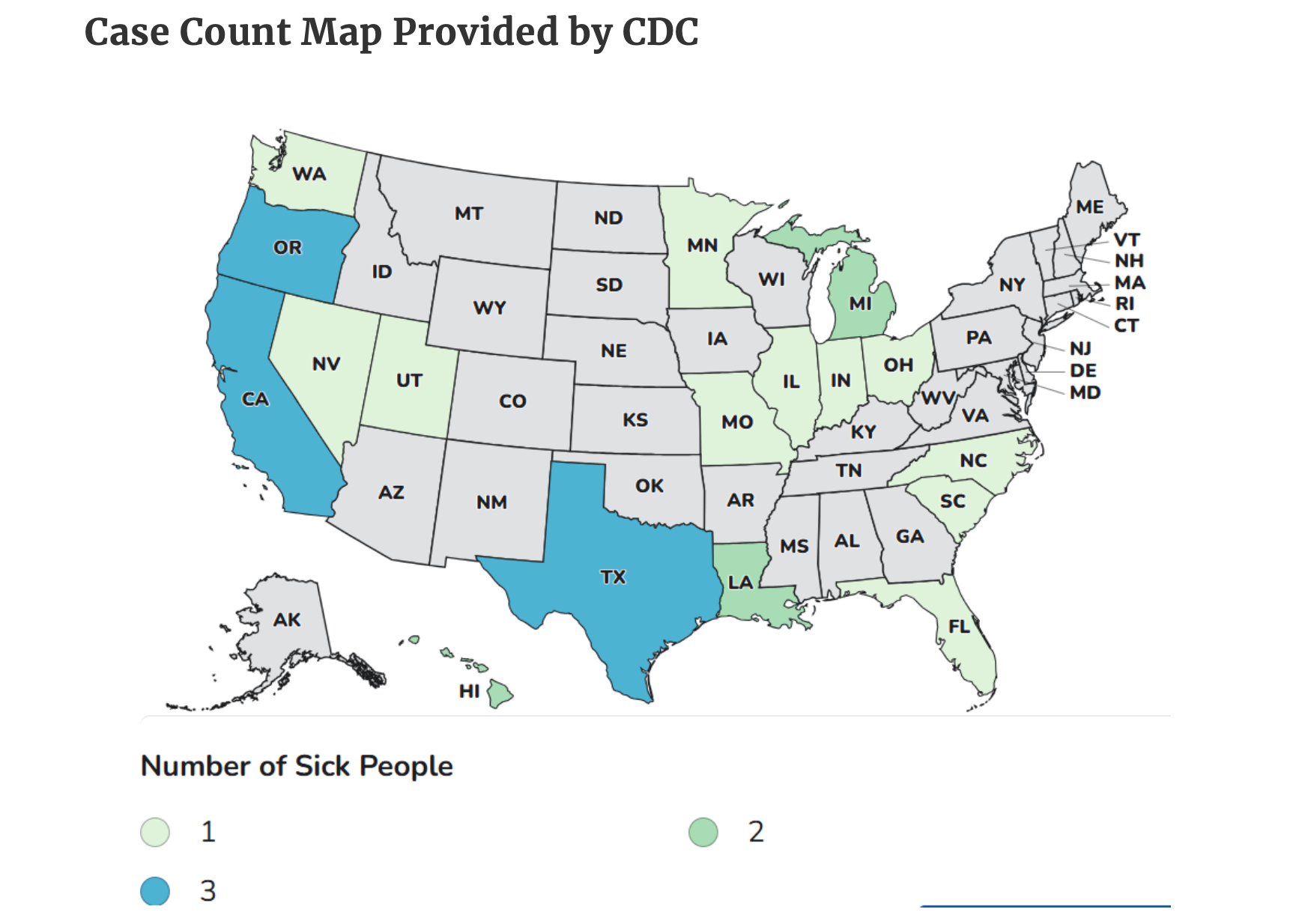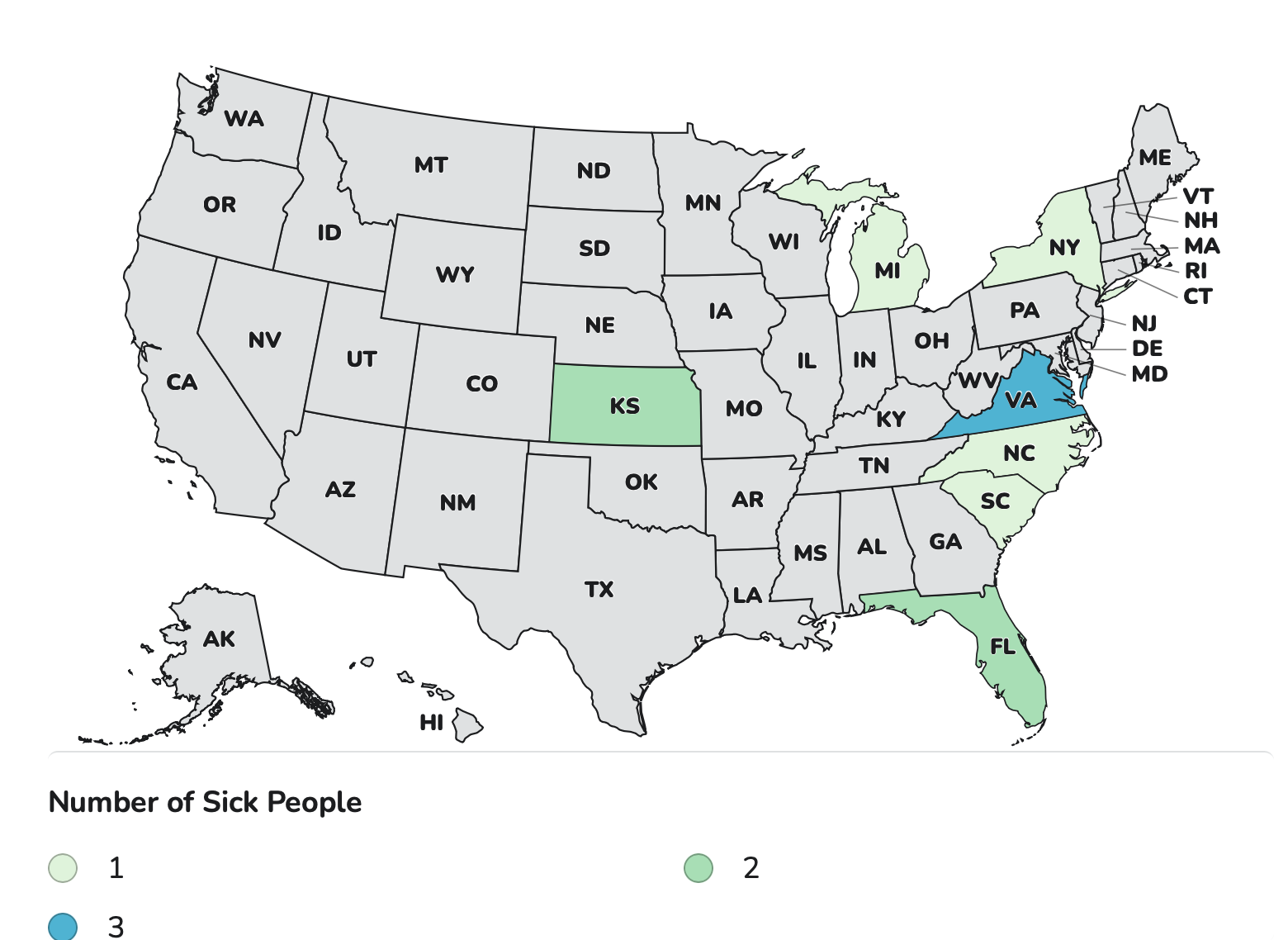Three more states are reporting people with Listeria infections in relation to pasta meals. Two more people have died.
The patient count now stands at 27 with sick people spread across 18 states, according to the Food and Drug Administration and the Centers for Disease Control and Prevention. Six people have died and one infection in a pregnant woman resulted in a fetal loss. The CDC first announced the outbreak on June 18.
“Epidemiologic, laboratory, and traceback data show that prepared meals containing pasta are contaminated with Listeria monocytogenes and are making people sick,” according to the CDC’s update on Oct. 30.
The outbreak patients range in from 4 to 92 years old. Twenty-five of the patients have been hospitalized. The most recent patient to be indentified became ill on Oct. 16.
According to the CDC there are likely more sick people than have been officially confirmed. This is because some people are not specifically tested for Listeria infection. Also, it can take up to 70 days for symptoms to develop and there is lag time of three to four weeks after patients are identified and when they are added to the nationwide count.
State and local public health officials are interviewing people about the foods they ate in the month before they got sick. Of the 13 people interviewed, 54 percent specifically remembered eating precooked meals, and 57 percent specifically reported eating chicken fettuccine alfredo.
“Ill people purchased these products from the refrigerated section at Walmart and Kroger. Two people also reported deli salads, that contained pasta, from other stores. Public health investigators continue to gather information on what ill people ate before getting sick to determine if additional products are linked to the outbreak, according to the CDC.
There are nine recalls associated with the outbreak. Consumers are urged to check their homes, including their freezers, for the recalled meals and discard them.
The recalled products as of Oct. 30 are:
- Sprouts Farmers Market Smoked Mozzarella Pasta Salad – product use by dates 10/10/25 – 10/29/25 (Sprouts Farmers Market recall)
- Giant Eagle smoked mozzarella pasta salad – expiration dates 9/30/25 through 10/7/25 (Giant Eagle recall)
- Kroger stores recalled deli bowtie and penne pasta salads – sold on AUG 29 2025 thru OCT 2 2025 (Kroger recall)
- Scott & Jon’s Shrimp Scampi with Linguini Bowls 9.6-oz – best if used by dates of 3/12/2027, 3/13/2027, 3/17/2027, 3/21/2027 (Demers Food Group Recall)
- Trader Joe’s Cajun Style Blackened Chicken Breast Fettucine Alfredo 16-oz plastic tray packages with “best if used by” dates of 9/20/2025, 9/24/2025, 9/27/2025, 9/28/2025, 10/01/2025, 10/03/2025, 10/05/2025, 10/08/2025, or 10/10/2025 (USDA FSIS public health alert)
- Albertsons stores recalled store-made deli pasta salads – sell thru dates from SEP 8 2025 to OCT 4 25 (Albertsons recall)
- Marketside Linguine with Beef Meatballs & Marinara Sauce 12-oz. – best if used by dates of SEP 22, 2025; SEP 24, 2025; SEP 25, 2025; SEP 29, 2025; SEP 30, 2025; and OCT 01, 2025 (USDA FSIS public health alert)
- Marketside Grilled Chicken Alfredo with Fettuccine 12.3-oz – best-by date of June 26, 2025, or prior; and 32.8-oz – best-by date of June 27, 2025, or prior (FreshRealm recall)
- Home Chef Chicken Fettuccine Alfredo 12.5-oz – best-by date of June 19, 2025, or prior (FreshRealm recall)
About Listeria infections
Food contaminated with Listeria monocytogenes may not look, smell or taste spoiled but can still cause serious and sometimes life-threatening infections. Anyone who has eaten any recalledproduct and developed symptoms of Listeria infection should seek medical treatment and tell their doctors about the possible Listeria exposure.
Also, anyone who has eaten any of the recalled products should monitor themselves for symptoms during the coming weeks because it can take up to 70 days after exposure to Listeria for symptoms of listeriosis to develop.
Symptoms of Listeria infection can include vomiting, nausea, persistent fever, muscle aches, severe headache, and neck stiffness. Specific laboratory tests are required to diagnose Listeria infections, which can mimic other illnesses.
Pregnant women, the elderly, young children, and people such as cancer patients who have weakened immune systems are particularly at risk of serious illnesses, life-threatening infections, other complications and death. Although infected pregnant women may experience only mild, flu-like symptoms, their infections can lead to premature delivery, infection of the newborn, or even stillbirth.
(To sign up for a free subscription to Food Safety News, click here)






